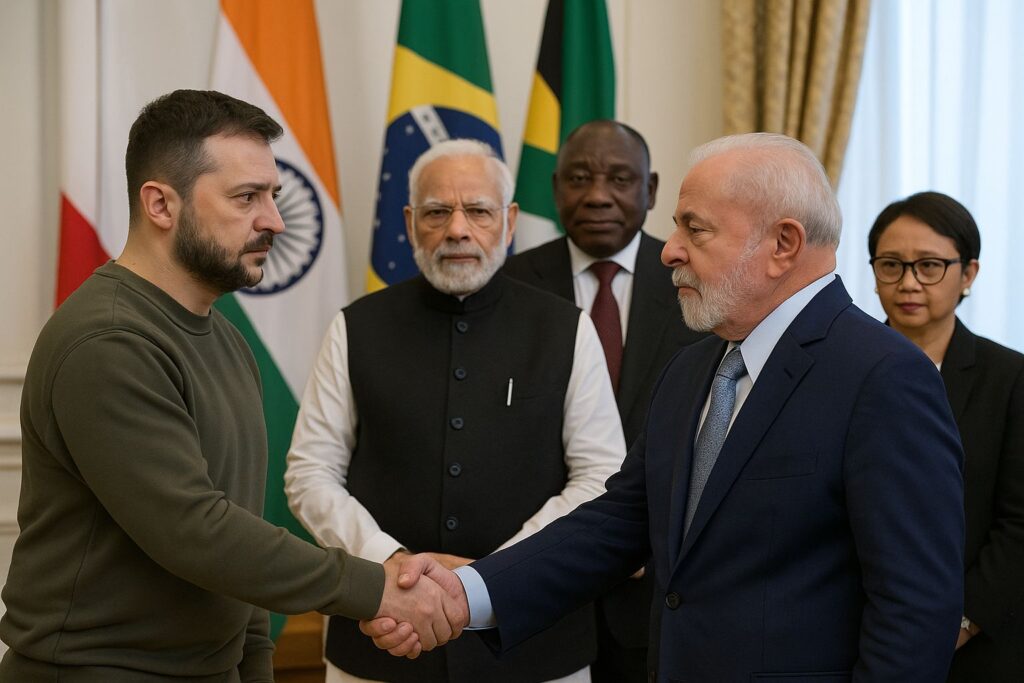
When Ukrainian President Volodimier Zelensky broadened his diplomatic gaze past the Euro-Atlantic vicinity, he redefined peacebuilding for the twenty-first century. His outreach, spanning the global South, is a strategic shift in global international relations, encompassing India, Africa, the Middle East, and beyond. More than symbolic gestures, those bold hints lay the muse stone for inclusive, multi-polar arbitration inside the Russia-Ukraine conflict.
Zelensky previously preached the idea of a “Global Peace Summit” as part of his Ukraine Peace Formula– a structure covering nuclear security, food access, and the release of prisoners and abducted children. He proposed that this summit include countries that actually represent the global majority, emphasizing that open, inclusive dialogue is the only viable pathway for permanent peace.
In particular, Zelensky suggested hosting a Second Peace summit in a global South country, keeping the door open to India, Saudi Arabia, Qatar, and Turkey. He exposed India as a particularly attractive place during a discussion with Prime Minister Narendra Modi, describing it as a “big country, great democracy“.
India: A Steady Neutral Reframing the Debate
India’s evolving role focused afresh, especially after several bilateral talks with Zelancesi in 2024. Prime Minister Narendra Modi met with Ukrainian leaders for the duration of the G7 Summit and then in Hiroshima in New Delhi, in which Kyiv urged India to include its Peace Formula.
The situation in India remains critical; While it belongs to Russia, it has also repeatedly supported sovereignty and dialogue. In turn, Zelensky worked to eliminate neutral narratives – accepting the notion that Ukrainians and Russians are “one people” – and emphasized European aspirations of Ukraine.
Africa: From Diplomatic Retreat to Strategic Alliance
Ukraine’s global South Outreach is also deeply spread in Africa. The Ukrainian-African Renaissance launched in early 2022 provoked a striking of diplomatic activity: Kyiv opened embassies across the continent, deployed high-level messengers, and offered humanitarian aid under the “Grain from Ukraine“.
Ukraine’s Foreign Minister, Dmytro Kuleba, visited the continent, including Morocco, Senegal, South Africa, and Egypt, with a mission to convey the plight of Ukraine and promote its peace proposal. As a result, about 30 African states publicly supported Ukraine’s peace formula.
South Africa played a visual role. In mid-2023, President Cyril Ramaphosa led an African delegation to Kyiv and Moscow to present the ten-point African peace plan. While the plan gained limited traction, it outlined Africa’s ability as an intermediary in global conflicts.
Middle East and Beyond: New Alliance in Motion
Zelensky’s diplomacy isn’t confined to Asia and Africa. In February 2025, he traveled to Abu Dhabi, where he signed an Economic Partnership Agreement with the UAE, installation a Ukraine-UAE Investment Council, and insisted on talks on peace, human priorities, and prisoner exchanges.
He demanded an engagement with Saudi Arabia, recognizing his role in the previous prisoner Swap, and designed it as a potential co-host to discuss peace.
Meanwhile, in August 2025, Zelensky urged the global south nations – especially after a conversation with President Ramaphosa – to send a “relevant signals” to interact with Russia and pressurize to end the war.
What It Means for Global Diplomacy?
This agenda shift indicates Ukraine’s determination to decenter Western intelligence-dominated diplomacy and build a broad alliance. India, Africa, the Arab Gulf, and beyond that, to promote Zelenskyy a more diverse, inclusive peace architecture.
These actors bring reliability, neutrality, and validity, which enrich the reliability of interaction. If there is a second global peace summit in India, or if the African mediator plays a large role, the result can reopen the multilateral conflict solution.
Ukraine also stands to achieve economically and politically: making long-term partnerships, attracting investment, and balancing the impact of Russia in developing areas.
Conclusion
Zelenskyy’s global South Outreach is not just a smart diplomacy – this is visionary leadership. By crossing traditional alliances, he cultivates a global consensus against the powerful aggression and towards shared peace.
As Ukraine strengthens relationships with emerging powers, this bet claims a reimagined world order – a one in which the Global South becomes a central broker in the creation of South peace and shapes the future of global diplomacy.

